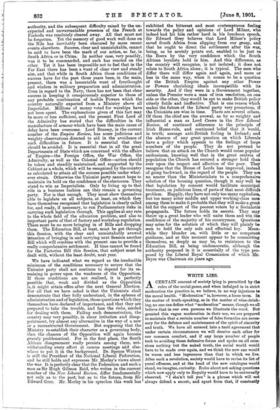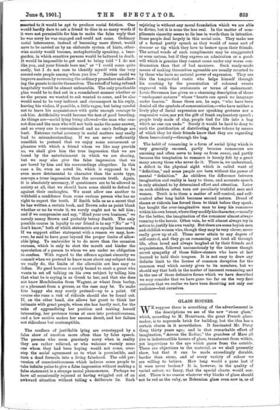w1li.b1 LIES.
ikCERTAIN amount of society lying is permitted by the rules of the social game, and when indulged in in strict moderation the practice is, we believe, in no way injurious to the moral health. "Moderation" is, however, a loose term. In the matter of truth-speaking, as in the matter of wine-drink- ing, no one can define what "moderation" means, though we all believe that in our own persons we illustrate the word. But granted this vague moderation in their use, we are prepared to maintain that a certain number of false formulas are neces- sary for the defence and maintenance of the spirit of sincerity and truth. We have all entered, into a tacit agreement that under certain circumstances we will deceive each other for our common comfort, and if any large number of people took to avoiding these defensive forms and spoke on all occa- sions nothing but the naked truth, the social world would have to be made over again, and we think the new one would be worse and less ingenuous than that in which we live. After such a revolution, society would have to revise its list of penal offences, and at the head of the new catalogue would stand, we imagine, curiosity. Rules about not asking questions which now apply only to Royalty would have to be universally observed. "I sha'n't tell you" is a phrase which will not always defend a secret; and apart from that, if constantly
resorted to it would be apt to produce social friction. One would hardly dare to ask a friend to dine in so many words if it were not permissible for him to make the false reply that he was sorry he was engaged and could not come. Ordinary ;ocial intercourse, instead of becoming more direct, would nave to be carried on by an elaborate system of hints, other- wise society would become, metaphorically speaking, a bear- garden, in which sensitive persons would be battered to death. It would be impossible to get used to being told "I do not like you, and your friends bore me," or I could come quite easily, but I do not care to identify myself with the very second-rate people among whom you live." Neither could we improve matters by reversing the ordinary procedure and allow- ing the guests to invite themselves. The rebuff of being refused hospitality would be almost unbearable. The only practicable plan would be to find out in a roundabout manner whether or no the person we wanted to ask wanted to come, and he also would need to be very indirect and circumspect in his reply, leaving his wishes, if possible, a little vague, but being careful not to leave his acquaintance with quite enough courage to ask him. Artificiality would become the test of good breeding. As things are—social lying being allowed—the man who can- not dine and the man who will not both make the same answer, and so every one is convenienced and no one's feelings are hurt. Extreme verbal accuracy in social matters may easily lead to misunderstanding. If we are never sufficiently unselfish to pretend that we enjoy some amusement or pleasure with which a friend whom we like may provide us, we shall give him the true impression that we are bored by the entertainment in which we are sharing, but we may also give the false impression that we are bored by him and his surroundings altogether. In this case a lie, even an acted lie, which is supposed to be even more detrimental to character than the acute type, conveys a truer impression than the accurate truth. Again, it is absolutely necessary, if questioners are to be allowed in society at all, that we should have some shield to defend us against their onslaughts. We must allow one another to withhold a confidence from some curious person who has no right to expect the truth. If Smith tells us as a secret that he has written a certain book, and Brown asks us point blank whether or no he wrote it, we surely ought not to tell him; and if we compromise and say, "Mind your own business," we merely annoy Brown and probably betray Smith. The only possible course in loyalty to our friend is to say "No" or "I don't know," both of which statements are equally inaceurate. If we support either statement with a reason we may, how- ever, be said to have gone beyond the proper limits of allow- able lying. To embroider is to do more than the occasion excuses, which is only to shut the mouth and hinder the speculation of a person to whom we are under no obligation • to confess. With regard to the offence against sincerity we commit when we pretend to know more about any subject than we really do, the limits of the allowable are less easy to define. No good hostess is surely bound to snub a guest who wants to set off talking on his own subject by telling him that what he is saying is as Greek to her, and that she does not know Mendelssohn from Wagner, or wheat from barley, or a pheasant from a grouse, as the case may be. To make him happy she may surely pretend—up to a point. Of course she runs a risk of ridicule should she be found out. If, on the other hand, she allows her guest to think her intimate with great people, whom she has hardly met, for the sake of aggrandising her position and making herself interesting, her pretence turns at once into pretentiousness, and a low motive makes her success deceit, and her failure not ridiculous but contemptible.
The confines of justifiable lying are overstepped by a false show of emotion more often than by false speech. The persons who seem genuinely sorry when in reality they are rather relieved, or who welcome warmly some one whom they had been hoping would not come, over- step the social agreement as to what is permissible, and turn a dead formula into a living falsehood. The odd per- version of conscientiousness which induces some people to • take infinite pains to give a false impression without making a false statement is a strange moral phenomenon. Perhaps we have all occasionally rejoiced at having wriggled out of an awkward situation without telling a deliberate lie. Such
rejoicing is without any moral foundation which we are able to divine, but it is none the less real. In the matter of com- pliments sincerity seems to lie less in words than in intention. Some people deal largely in this social coin. They make use of a formal pretty speech as they would of some sort of douceur or tip which they love to bestow upon their friends. The actual words of such compliments may be exaggerated or even untrue, but if they express an admiration or a good- will which is genuine they cannot come under any worse con- demnation than that of bad manners. Such ready-made means of making themselves agreeable are usually resorted to by those who have no natural power of expression. They are like the tongue-tied rustic who helps himself through his courting by the presentation of coloured sweets engraved with fine sentiments or terms of endearment. Louis Stevenson has given us a charming description of those " uneloquent natures" whose "hearts can speak no language under heaven." Some there are, he says, "who have been denied all the symbols of communication,—who have neither a lively play of facial expression nor speaking gestures nor a responsive voice, nor yet the gift of frank explanatory speech ; people truly made of clay, people tied for life into a bag which no one can undo." Surely it would be hard to deny to such the gratification of distributing those tokens by means of which they let their friends know that they are regarding them benevolently—through the bag.
The habit of romancing is a form of social lying which is very generally excused, partly because romancers are amusing and often serve to keep us from ennui, and partly because the temptation to romance is keenly felt by a great many among those who never do it. There is, we understand, a defect in the physical sight which is called want of "definition," and some people are born without the power of mental "definition." As children the difference between imagination and reality is hazy to them, and accurate speech is only attained to by determined effort and attention. Later on such children often turn out peculiarly truthful men and women. Truth is to them a matter of self-control, and self- control after long •habit becomes second nature. Dread •of shame or ridicule has forced them to think before they speak, has taught the over-imaginative man to keep his romances within his own breast, where they modify his character,—usually for the better, the imagination of the romancer almost always running to the heroic. Often vain, he will almost always try in action to justify his own vanity. But there are some boyish men and childish women who, though they may be very clever, never really grow up at all. These never attain to any degree of self-control, and they go on romancing out loud all through life, often loved and always laughed at by their friends and acquaintance, followed unconsciously by the intense though secret sympathy of those fellow-sinners who have at last learned to hold their tongues. It is not easy to draw any definite limit to the license of common deception for the common weal which society gives to its members, but we should say that both in the matter of innocent romancing and in the use of those defensive forms which we have described we may consider that we have gone too far on the very first occasion that we realise we have been deceiving not only our audience—but ourselves.







































 Previous page
Previous page